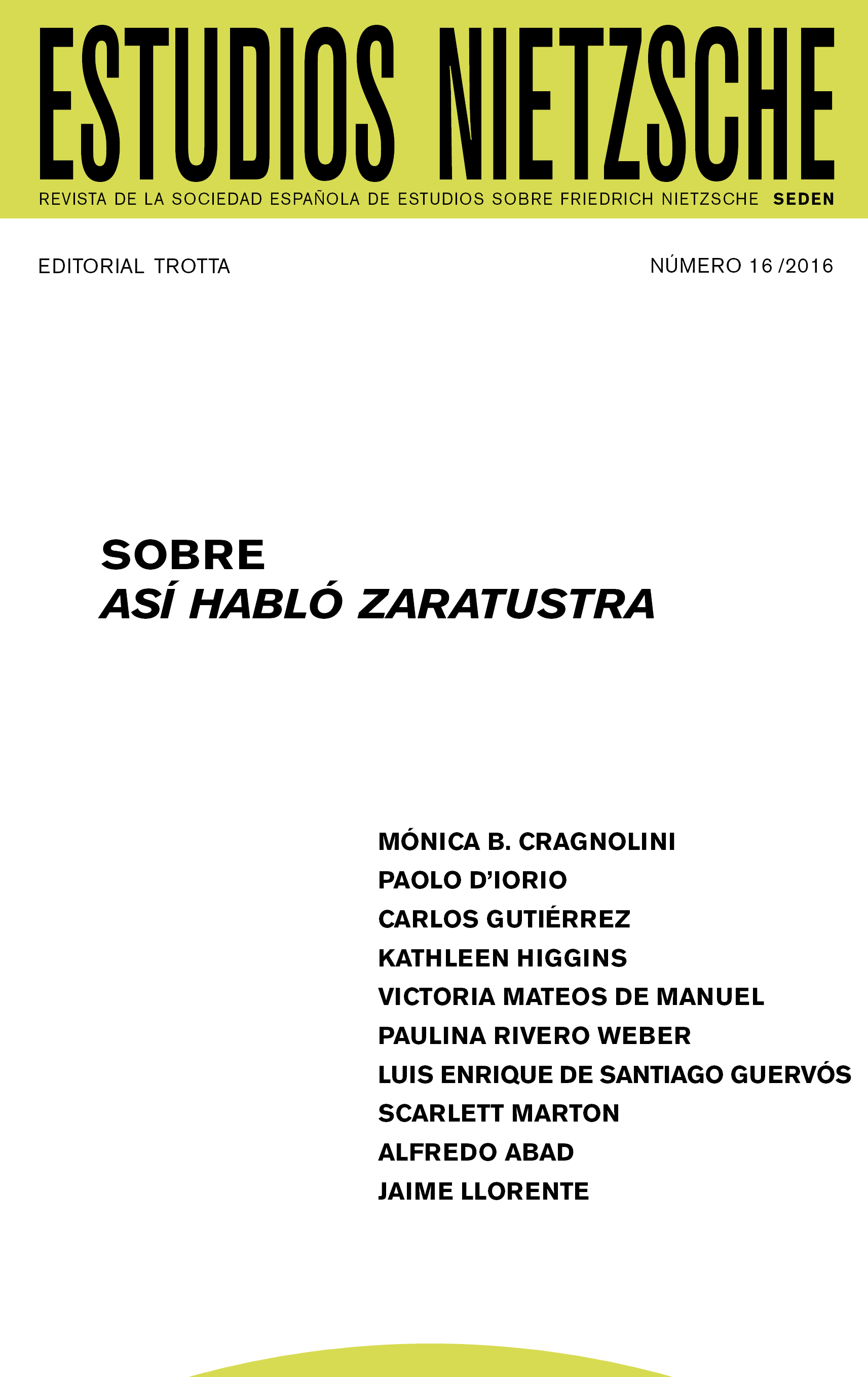Noon. Nietzsche and the Issue of Time: On the Meaning of Present in Philosophy
DOI:
https://doi.org/10.24310/EstudiosNIETen.vi16.10817Keywords:
Geist der Schwere, mittags, kinder land, inminence, abyss, rhythmAbstract
In this article I propose that Nietzsche’s contrast between thought —der Geist der Schwere— and life —liebliche Mädchen, Mädchen-Füßen mit schönen Knöcheln— is mainly based on the question of temporality and rhythm. This dialectical metaphor is developed in his book Also sprach Zarathustra and it shows that philosophy and life are not synchronous, they have different beats. Philosophy and life do not happen simultaneously and Nietzsche proposes two possible anachronies in which thought takes place. Firstly,
philosophy is a sort of past time: it gives a later sense or subsequent meaning to existence, and narration is a way of intensifying life. Secondly, thought belongs to the temporality of imminence and language can be understood as a sort of Apollonian dam that helps to restrain and filter the Dyonisian pole of existence. Compared to these two time-modes, Nietzsche makes a proposal in Also sprach Zarathustra that manages to articulate the possibility of a present time for philosophy: its present is not the one that takes place when
the text is being written, but rather the actualisation of the text through readers —das Kinder Land—.
Downloads
Metrics
References
Alhadeff, Albert 1988: The Raft of the Meduse. Géricault, Art, and Race, Munich, Berlin, London, New York: Prestel.
Baxmann, I 2000: Gemeinschaft. Körper- und Tanzkulturen in der Moderne, Münschen: Fink.
Bécquer, Gustavo Adolfo [1858-1864] 1970: Leyendas y narraciones, Madrid: Editorial Libra.
Freud, Sigmund (1988) [1906]: “El delirio y los sueños en la «Gradiva» de W. Jensen, en Freud, Sigmund: Obras completas, volumen 6: Ensayos XXVI-XXXV. Barcelona: Orbis, pp. 1285-1336.
Ginot, Isabelle/ Michel, Marcelle 2002: La danse au XXe siècle, Paris: Larousse.
Gombrich, E. H. (1992): Aby Warburg. Una biografía intelectual. Con una memoria sobre la historia de la Biblioteca a cargo de F. Saxl. Traducción del inglés a cargo de Bernardo Moreno Carrillo. Madrid: Alianza Editorial.
Hanse, Olivier 2010: À l’ecole du rythme: utopies communitaires allemandes autor de 1900, Saint-Étienne: Publications de l’Université de Saint-Etienne.
Jensen, Wilhelm [1903] 2013: Gradiva. Ein pompejanischen Phantasiestück, Berlin: Holzinger.
Müller, H./ Stöckemann: <<…jeder Mensch iste in Tänzer>>. Ausdruckstanz in Deutschland zwischen 1900 und 1945, Giessen: Anabas 1993.
Nehamas, Alexander 1985: Nietzsche. La vida como literatura, traducción de Ramón J. García, Madrid: Turner, Fondo de Cultura Económica.
Nietzsche, Friedrich [1872] 2007 : El nacimiento de la tragedia. O helenismo y pesimismo, edición de G. Cano, Madrid: Biblioteca Nueva.
Nietzsche, Friedrich [1874] 2009: Schopenhauer como educador, edición de J. Muñoz, Madrid: Biblioteca Nueva.
Nietzsche, Friedrich [1883-1885] 1981: Así habló Zaratustra. Un libro para todos y para nadie, edición de A. Sánchez Pascual, Madrid: Alianza Editorial.
Nietzsche, Friedrich [1888] 2002: El crepúsculo de los ídolos o cómo se filosofa con el martillo, edición de D. Gamper, Madrid: Biblioteca Nueva.
Nietzsche, Friedrich 2003: Escritos sobre Wagner, edición de Joan B. Llinares, Madrid: Biblioteca Nueva.
Picó Sentelles, David 2005: Filosofía de la escucha. El concepto de música en el pensamiento de Friedrich
Nietzsche, prólogo de Miguel Morey, Barcelona: Crítica.
Safranski, Rüdiger 2010: Nietzsche. Biografía de su pensamiento, traducción de Raúl Gabás, Barcelona: Tusquets.
Tatarkiewicz, Wladyslaw 1970: Historia de la estética. 1. La estética antigua, traducción del polaco de Danuta Kurzyca, Madrid: Akal.
Downloads
Published
How to Cite
Issue
Section
License

This work is licensed under a Creative Commons Attribution-NonCommercial-ShareAlike 4.0 International License.
As of issue 21 (2021) this journal is published only in open access (diamond route).
From that number 21, like the previous numbers published in NIETZSCHE STUDIES, they are subject to the Creative Commons Acknowledgment-NoComercia-ShareIgual 4.0 license, the full text of which can be consulted at <http://creativecommons.org/licenses/by-nc-sa/4.0 >
It is the responsibility of the authors to obtain the necessary permissions of the images that are subject to copyright.
This work is licensed under a Creative Commons Attribution-NonCommercial-ShareAlike 4.0 International License.
Copyright generates two different rights: moral rights and patrimonial rights that EJFB recognizes and respects. Moral rights are those relating to the recognition of the authorship. They are rights of a personal nature that are perpetual, inalienable, unseizable and imprescriptible as consequence of the indivisible union of the author and his/her work.
Patrimonial rights are those that can be derived from the reproduction, distribution, adaptation or communication of the work, among others.







11.png)
